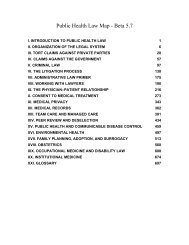The Nation's Responses To Flood Disasters: A Historical Account
The Nation's Responses To Flood Disasters: A Historical Account
The Nation's Responses To Flood Disasters: A Historical Account
Create successful ePaper yourself
Turn your PDF publications into a flip-book with our unique Google optimized e-Paper software.
34<br />
<strong>The</strong> Nation’s <strong>Responses</strong> to <strong>Flood</strong> <strong>Disasters</strong>: A <strong>Historical</strong> <strong>Account</strong><br />
advice fell on deaf ears. <strong>The</strong> first administrator, George Bernstein, convinced that<br />
Congress wanted a national program established promptly, blanketed the nation with this<br />
new program. 83<br />
Congress established the NFIP as a “quid-pro-quo” program. Through it, relief<br />
from the impacts of flood damages in the form of federally-backed flood insurance<br />
became available to participating communities contingent on flood loss reduction<br />
measures embodied in state and local floodplain management regulations. Occupants of<br />
existing structures in floodprone areas would benefit from subsidized 84 flood insurance<br />
premiums, but new floodplain occupants would have to pay actuarially-based premiums.<br />
Those already living in the floodplain likely did not understand the flood risk involved in<br />
their locational decisions, but future occupants would through information provided by<br />
the NFIP. <strong>The</strong> program would be strictly voluntary in terms of community participation<br />
and individual purchase of insurance. As history would reveal, the NFIP would<br />
ultimately have a profound impact in two important areas: first, by accelerating the<br />
identification of floodprone areas on maps, and; second, in providing incentives for state<br />
and local units of government to enact measures to regulate development in these<br />
identified areas.<br />
Passage of the National <strong>Flood</strong> Insurance Act (Title XIII of the Housing and<br />
Urban Development Act of 1968) marked an important change in federal flood control<br />
policy. Adler, in his article Addressing Barriers to Watershed Protection, 85 stated that in<br />
theory it represented a quantum shift in policy. Primary responsibility for managing the<br />
floodplains still remained with local government, but now development was to occur<br />
consistent with the flood risk. <strong>The</strong> act was to return the cost for location decisions back<br />
to the landowner and to account for the total cost in any decision regarding occupancy or<br />
use of flood hazard areas, thereby shifting the burden from the taxpayer.<br />
<strong>The</strong> FIA managers came from the insurance industry and established an<br />
actuarially sound program. Insurance views and considerations drove many of the early<br />
program measures, such as initial determinations of flood hazard areas. A number of<br />
federal agencies resented the program because it impinged upon traditional program<br />
areas. 86 In addition, countless communities were not ready to accept the program’s<br />
requirement for floodplain management.<br />
Congress tasked the FIA to carry out studies to determine local flood hazard<br />
areas within which flood insurance provisions and appropriate land use regulations would<br />
be applied. <strong>The</strong> FIA adopted the 1 percent annual chance as a minimum national<br />
standard for floodplain management, based upon a recommendation of a special review<br />
committee of national experts that met at the University of Chicago in December 1968.<br />
83 Reuss, Water Resources People and Issues, p. 55.<br />
84 Subsidized in the form of payment from other policyholders.<br />
85 Adler, Robert W., “Addressing Barriers to Watershed Protection,” Environmental Law, 25(1995), p. 1034.<br />
86 Thomas interview, 13 October 1999.
















